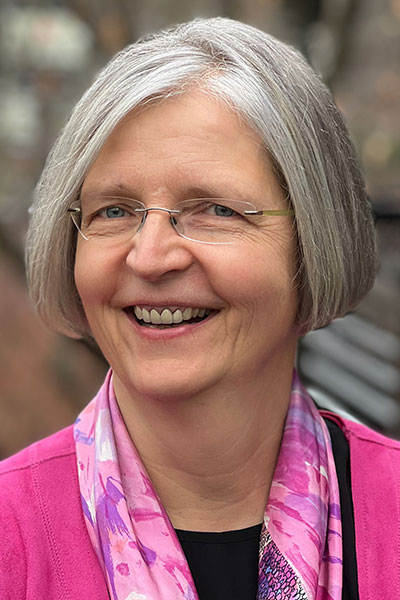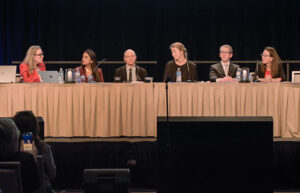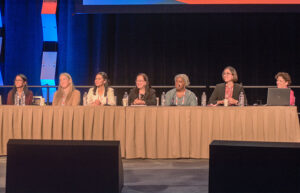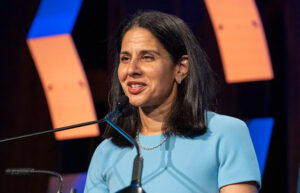Lobular breast cancer has unique features that set it apart from other types of breast cancer. There are multiple distinct lobular breast cancer subtypes, all with different outcomes, potentially different biomarkers, and different therapeutic targets.

“There has been a lot of eye opening recently about the many unique aspects of lobular breast cancer,” said Steffi Oesterreich, PhD, Professor of Pharmacology and Chemical Biology at the University of Pittsburgh Medical Center (UPMC) and Co-Leader of the Cancer Biology Program at UPMC Hillman Cancer Center.
“Not that long ago, everyone said lobular breast cancer is nothing special,” she said. “I like to show excerpts from textbooks that say we don’t need to consider lobular as anything different from another estrogen receptor-positive breast cancer. Over the past decade, we have started lobular-specific clinical trials, consortia forming, and patient advocacy.”
The 2025 San Antonio Breast Cancer Symposium® will present Special Session 2: Lobular Breast Cancer Updates on Tuesday, December 9, from 11 a.m. to 12:30 p.m. CT in Stars at Night Ballroom 3-4 at the Henry B. Gonzalez Convention Center. Sponsored by the Lobular Breast Cancer Alliance (LBCA), an organization dedicated to educating about lobular breast cancer, this session is designed to amplify dialogue among patients, scientists, clinicians, and breast cancer organizations about lobular breast cancer and research advocacy.
Dr. Oesterreich and Marleen Kok, MD, PhD, Medical Oncologist and Breast Cancer Immunotherapy Group Leader at the Netherlands Cancer Institute, will co-moderate the session.

“Thanks to scientific research and key global collaborations, we now know that the presentation and course of disease can be very different for patients with lobular breast cancer,” compared with more common types of breast cancer, Dr. Kok said. “This impacts not only the diagnostic procedures but also the likelihood of therapy response. It is extremely important to execute clinical trials specifically for patients with lobular breast cancer.”
Low incidence has been a persistent barrier to improving recognition of lobular breast cancer. Only 10% to 15% of breast cancers are lobular, Dr. Oesterreich noted. It has been difficult to accrue sufficient patient numbers to conduct trials examining initial treatment responses, much less trials with long-term follow up to study patterns of recurrence.

“There is growing data showing that lobular breast cancer has a delayed recurrence after initial diagnosis,” said Session Panelist Flora Migyanka, a patient advocate, a founding advocate of the LBCA, a member of the LBCA Patient Advocate Advisory Board, and the founder of the Dynami Foundation. “With triple-negative breast cancer, you have a very strong positive outlook moving forward after five years without recurrence. With lobular breast cancer, we are seeing more delayed recurrences — 13, 15, 20 years out. The data now are suggesting that lobular has worse long-term survival compared to ductal breast cancer.”
Patient advocacy has played a key role in focusing attention on lobular breast cancer, Dr. Oesterreich said.
“People are more aware that lobular breast cancer has unique aspects,” she explained. “Patients with lobular breast cancer are often excluded from trials, either because lobular is ‘only’ 10% and the statistics can get challenging if you have a population that responds differently. Or they are excluded because very often patients with lobular breast cancer have metastatic disease that is not measurable.”
A recent patient survey to be presented at SABCS found that 25% of patients with advanced lobular breast cancer were misdiagnosed and 50% of patients had a 12-month or longer delay in diagnosis.
“Physicians should be aware that lobular breast cancer could look different in patients,” Dr. Oesterreich said. “Many patients feel they are not taken seriously when reporting unusual symptoms. Clinicians really need to be aware of histological subtypes. Patients were instrumental in getting advocacy started, such as Dynami and the LBCA. The LBCA website lists trials specifically for lobular breast cancer.”
There are still too many misconceptions, Dr. Oesterreich said, including that lobular breast cancer is unresponsive to chemotherapy. The reality is that some lobular cancers are responsive, but there are, as yet, no appropriate biomarkers to help predict responses.
“We need to know more about lobular breast cancer patients,” Migyanka said. “Each patient is unique, some with a mixed subtype of lobular and ductal, some with very low expression levels of estrogen and progesterone receptors that act like triple negative but are a little more aggressive. Because there is no specific treatment for lobular breast cancer, it is too easy for breast oncologists to lump patients together. I would love to see more inclusive clinical trials and stronger partnerships with other breast cancer organizations to address the needs of patients with lobular breast cancer.”
Session titles, times, and locations are subject to change. For the most up-to-date SABCS program information, please visit the Program page at SABCS.org.





